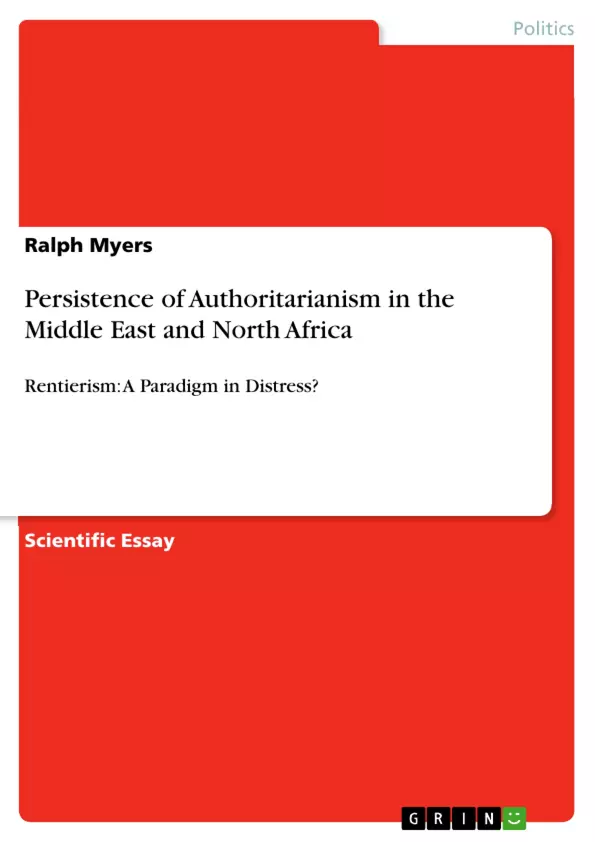The region of the Middle East and North Africa (MENA) appears to be an exception when it comes to the persistence of authoritarianism. Whereas most other regions in the world have embarked upon a path of democratisation, trends in the MENA appear to be adverse. Not only is the MENA’s record appalling in terms of electoral democracies, but the region, on average, has not experienced an improvement in civil liberties and political rights for the last thirty years. This paper will look at two aspects concerning the persistence of authoritarianism in the region. The principal aim will be to analyse what the principle cause for the persistence of authoritarianism in the MENA is. A secondary objective will be to establish whether the term MENA exceptionalism is applicable, or whether the persistence of authoritarianism in the region can be explained through general theories on the subject.
The paper analyses the reasons why scholars deem the MENA to be exceptional, and which variables they believe contribute to the persistence of authoritarianism in the region. Those arguments are then refuted, arguing instead that rentierism is the principal independent variable with regards to the robustness of authoritarian regimes in the MENA. The focus then shifts to the concept of rentierism in general and more specifically its relation to oil rich countries. Finally the paper looks at how oil poor countries also benefit from rents and how it is possible that levels of authoritarianism in oil rich countries are not hugely affected by oil price fluctuations.
Inhaltsverzeichnis (Table of Contents)
- Introduction
- MENA Exeptionalism?
- Oil Rents and the Persistence of Authoritarianism
Zielsetzung und Themenschwerpunkte (Objectives and Key Themes)
This paper examines the persistence of authoritarianism in the Middle East and North Africa (MENA) region. Its primary objective is to analyze the principal cause of this trend, while also exploring whether the term "MENA exceptionalism" is applicable or if the persistence of authoritarianism can be explained by broader theories.
- The persistence of authoritarianism in the MENA region
- The role of rentierism in sustaining authoritarian regimes
- The significance of oil rents in shaping political stability
- The relationship between authoritarianism and civil society
- The impact of external pressure on political transition
Zusammenfassung der Kapitel (Chapter Summaries)
Introduction
The paper sets the context by highlighting the seemingly paradoxical trend of persistent authoritarianism in the MENA region, contrasting it with democratic advancements in other parts of the world. It outlines the paper's objective to investigate the primary cause of this phenomenon and determine whether the region's experience is exceptional or can be explained by general theories on authoritarianism.
MENA Exeptionalism?
This chapter explores the concept of "MENA exceptionalism," examining arguments put forth by scholars who claim that the region's experience with authoritarianism is unique and cannot be explained by general theories. It critically analyzes various proposed variables contributing to the persistence of authoritarianism, including cultural factors, state coercion, and external rent revenues.
Oil Rents and the Persistence of Authoritarianism
The paper focuses on the concept of rentierism, arguing that it is the primary factor responsible for the widespread and persistent nature of authoritarianism in the MENA region. The chapter explores the mechanisms by which rentierism strengthens authoritarian regimes, including the repression effect and the taxation effect, while also considering the role of selective rent distribution in creating clientelist networks. It further examines the empirical evidence supporting the rentier effect in the MENA region, highlighting the connection between oil wealth and political stability.
Schlüsselwörter (Keywords)
The main keywords and focus topics of this paper include: authoritarianism, rentierism, MENA exceptionalism, oil rents, political stability, civil society, external pressure, democratic transition, and the role of external rents in sustaining authoritarian regimes.
Frequently Asked Questions
What is "MENA exceptionalism"?
It is the theory that the Middle East and North Africa region is unique because it has resisted the global trend of democratization, maintaining authoritarian regimes for decades.
What is the primary cause of persistent authoritarianism in the MENA region?
The document argues that rentierism, particularly wealth from oil rents, is the principal factor sustaining these regimes.
How does the "taxation effect" relate to rentierism?
In rentier states, governments rely on external rents (like oil) rather than taxes from citizens; because citizens aren't taxed, they often demand less political representation and accountability.
What is the "repression effect"?
It refers to the ability of oil-rich regimes to use their wealth to fund large internal security forces to suppress any political opposition.
Do oil-poor countries in the MENA region also benefit from rents?
Yes, the paper examines how oil-poor countries benefit from strategic rents or aid from oil-rich neighbors, which also helps sustain their authoritarian structures.
Has the region seen improvements in civil liberties in the last 30 years?
According to the abstract, the region on average has not experienced significant improvements in political rights or civil liberties during this period.
- Citation du texte
- Ralph Myers (Auteur), 2009, Persistence of Authoritarianism in the Middle East and North Africa, Munich, GRIN Verlag, https://www.grin.com/document/159578



